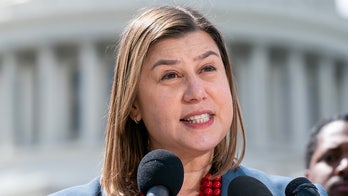For anybody who thought jobs and the economy had sidelined wedge issues this campaign year, think again.
In the latest sign the culture wars are alive and well, voters going to the polls in North Carolina on Tuesday will decide on a constitutional amendment that would ban same-sex marriage in the state.
While same-sex marriage already is prohibited by law, North Carolina is the only southern state that doesn't have that ban enshrined in its constitution.
Why the need now? State Sen. Dan Soucek, one of the primary sponsors of the proposed amendment, said he's pushing it out of concern for "the possibility of a rogue judge overturning the law."
"There are lawsuits right now with people judge-shopping -- looking to find a way to overturn the law," he said.
The amendment stipulates that "marriage between one man and one woman is the only domestic legal union that shall be valid or recognized in this state."
Without mentioning it, the measure would also ban gay marriage alternatives like "civil unions" and "domestic partnerships." "We didn't want civil union to be a marriage clone. We wanted that institution to be protected, not just the word," Soucek told Fox News.
Opponents, including some conservatives, believe that in banning civil unions and domestic partnerships the amendment goes too far.
They warn of "unintended consequences," saying non-married couples -- even heterosexuals -- could lose benefits like medical care, hospital visitation and more. And they point to a 2004 court case in Ohio. After that state passed a similar amendment, a judge dismissed a charge of felony domestic abuse because the supposed perpetrator wasn't married to the woman he allegedly abused. The Ohio Supreme Court eventually overturned the ruling, but it took three years. In the meantime, said UNC law professor Maxine Eichner, there were plenty of "unintended consequences".
"In Ohio, 30 cases were dismissed. Not because the abuser didn't abuse their partner, but because they weren't married to their partner," Eichner said.
The main organization lobbying against the amendment is Protect All NC Families. Jeremy Kennedy insists this measure goes far beyond its intent.
"Legal scholars have backed us up - and we've seen it from other states -- that there are unintended consequences to this amendment. And they will happen in this state," he said.
Supporters of Amendment 1 call those arguments misguided. State House Republican leader Paul Stam says the state already has rock-solid protections against domestic abuse - regardless of marital status. And the amendment he helped author has specific language that would allow companies to extend benefits to same-sex or unmarried couples.
"They have a whole raft of frivolous objections because they're opposed to the uniqueness of marriage," Stam said.
It may be the only way to fight against the amendment. In a Public Policy Polling survey released Monday morning, 57 percent of voters said they are opposed to same-sex marriage.
Opponents of Amendment 1 presume that if they wage the battle on the grounds of gay rights, they'd probably lose. The best way to raise objections, they claim, is to focus on the broader potential consequences.
"We think we're on the right side of what North Carolinians want for the state," Kenney said. "And part of the problem is there is so much misinformation about this amendment that people don't know what they're voting on."
It may be that people don't know the whole story. PPP found that while a 55 percent majority of North Carolinians supports the amendment, a slightly smaller majority of 52 percent also supports the idea of either same-sex marriage or "civil unions."
Whether the amendment passes or fails could depend on turnout. The Republican primary is all but over. On the Democratic side, there are a number of tight state races - including the nomination for governor -- on the ballot. Early voting trends in North Carolina have Democratic votes outpacing Republican ones.
The question is whether the amendment will be enough to bring conservatives out to the polls Tuesday in large numbers.
Tami Fitzgerald, who is leading the campaign in support of the amendment, thinks they'll come out.
"The people of the state recognize the importance of protecting marriage between a man and a woman," she told Fox News. "That alone will bring the people out to vote."





